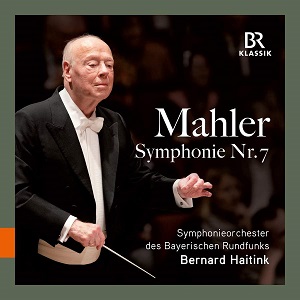
Gustav Mahler (1860-1911)
Symphony No. 7 in E Minor ‘Song of the Night’
Symphonieorchester des Bayerischen Rundfunks/Bernard Haitink
rec. live, 14-18 April 2011, Philharmonie im Gasteig, Munich
BR Klassik 900209 [82]
It was certainly something of a surprise to me, when producing my conspectus on Mahler’s Seventh Symphony, to find that the most difficult section to write was about one of the most dependable of conductors, Bernard Haitink. This was largely due to Haitink’s inconsistency over the eight different recordings available at the time, both live and in the studio, from 1969 to 2009, where he often switched from performances that were swift and exciting in the concert hall, to something slower and more introspective in the recording studio, sometimes even in the same year. This was especially obvious with his second studio recording, made with the Concertgebouw in 1982 where long passages of the score were taken more patiently than usual, not least when compared to his first recording in 1969 which, at seventy-six minutes, was some five minutes faster, as were the live tapings in 1983 and at the famous Christmas Day 1985 television broadcast, again, all with the Concertgebouw Orchestra. At the time, I could not help wondering if he had in his mind an ‘ideal’ interpretation, much slower than the sub-eighty minute norm and which eventually fully blossomed in a live taping with the Berlin Philharmonic in 2009 which, with a running time of just under eighty-five minutes, was not just slow by the usual benchmark, but was nearly ten minutes longer than those earlier ones with the Concertgebouw. At the time, I felt this late performance, currently only available via the Berlin Philharmonic’s Digital Concert Hall, was something of a summation of Haitink’s life work with Mahler’s most enigmatic symphony, describing the performance: “… as if Haitink has carved a monument out of beautiful marble, exquisite in its detail, cool and yet at all times fascinating and super-intense for the entire near eighty-five-minute duration”. Yet now there is this new release of an even later reading from 2011, this time with the Bavarian Radio Symphony Orchestra which, true to form, differs once more.
If Haitink’s tempos in this work never really settled to a consistent norm, his Mahlerian style most certainly did. Not for him in this music were the hothouse passions of Bernstein, nor the child-like wonder of Tennstedt and most certainly not the cataclysmic sound-busters of Solti. Rather, Haitink played Mahler’s scores ‘straight’, with exquisite taste and restraint, so in the central scherzo of the Seventh Symphony, there are none of the burps and other rude noises of the young and exuberant James Levine with the Chicago Symphony and nor does his music making cause the listener to shudder as with Rafael Kubélik, especially in his remarkable studio account, likewise with the Bavarian RSO on DG, where the unnerving sense of cobwebs brushing against your face with evil slithering in the shadows is palpably real. Instead, Haitink’s things-that-go-bump-in-the-night are a highly refined and polite bunch who you wouldn’t think twice of inviting round for tea with your mother. However, at his best in this symphony – which I would say is the live 1985 Kerstmatinee that can still be found (if you look hard enough) both on CD and DVD released by Philips Classics – he can still produce the most satisfying results.
Alas, I fear that this posthumously released live composite from Bavaria does not really add much to the narrative of this symphony on record, nor to Haitink’s involvement in it. Not that there is anything particularly wrong with this performance, since it is clearly the work of a master conductor who has rehearsed his orchestra beautifully, which in turn follows him devotedly throughout this patient and unhurried performance. The audience are virtually silent, there is no applause at the end, and the Bavarian engineers have captured everything in very fine sound, with a spectacularly well caught bass drum. However, at eighty-two minutes, not only is it slower than any of his Concertgebouw performances (deceptively so, given the fashionably swift rendition of the second Nachtmusik), but it also lacks the fire of those earlier readings. Moreover, in spite of being faster than the late Berlin Digital Concert Hall performance, it lacks its remarkable intensity as well. In short, what may have been a fine concert of an important Mahlerian conducting a great Mahler ensemble in that composer’s Seventh Symphony, this new release is not the best example of Haitink in a work that, even at his finest, was never quite amongst greatest renditions of this symphony. In some respects, it is fair to ask what the point of its release was in the first place?
According to the discography of this symphony on the Mahler Foundation website, there are over one hundred and forty different recordings of Mahler’s Song of the Night, live and in the studio, official releases or otherwise, with the earliest by Hans Rosbaud and Hermann Scherchen from the early 1950’s to the most recent by Alexandre Bloch in 2019 with the Orchestre Nationale de Lille. Having heard and considered most of these for my conspectus, I still maintain the finest recordings remain Bernstein’s 1965 account with the New York PO as well as, in more modern digital sound, Michael Tilson Thomas’s account with the London SO from 1997, with Klaus Tennstedt’s astonishing last recording, live with the London PO from 1993, as an alternatively grim and dark reading of the score. If you must have Bernard Haitink, the live performance from Amsterdam on December 25th 1985, finds him at his considerable best – just as we all are on Christmas Day.
Lee Denham
Help us financially by purchasing from





















